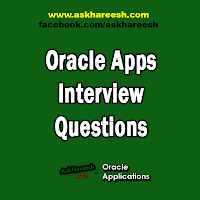- Handler is a group of packaged procedures which is used by Oracle Applications to organize . PL/SQL code in forms.
- Handlers provide a way to centralize the code so that it becomes easier to develop, maintain and debug.
- The packaged procedures available in a handler are called form the triggers by passing the name of the trigger as an argument for the procedure to process.
- Handlers types are : Item Handlers, Event Handlers, Table Handlers and Business Rules
- Handlers reside in program units in the form or in stored packed in the database.
- Coding logic for window and alternative region control.
- Adding fin-windows and/or ROW-LOV?S and enable query-find.
- Coding logic for item relations such as dependent fields.
- Coding messages to use message dictionary.
- Adding FF logic if required.
- Adding choices to the special mence and logic to modify choices the default menu and tool bar behavior is necessary.
- Coding any other logic.
- Creating a form function for the developed form and registering any sub functions.
- Testing the form by it self.
- Registering the form with AOL.
- Adding the form function to a menu or creating custom mence.
- Assigning the menu to the responsibility and assigning the responsibility to the user.
- Testing the form within Oracle Applications.
34) What is a Data Group?
- A data group is a group of oracle applications and the Oracle ID?s of each application Oracle ID grants access privileges to tables in an Oracle Database.
- Data group determines which Oracle Data base accounts a responsibilities forms, concurrent programs and reports connect to.
Responsibility defines Applications Privileges, A responsibility is a level of authority in Oracle Applications that lets users only those Oracle Applications functions and data appropriate to their roles in an organization.
36) What are security Attributes?
Security Attributes are used by Oracle self service web Applications to allow rows of data to be visible to specified users responsibilities based on the specific data contained in the row.
37) What is a Profile Option?
- Profile options are the set of changeable options that affects how the application looks and behaves.
- By setting profile options, the applications can be made to react in different ways for different users depending on the specific user attributes.
- designing the table structure
- creating fields on the form (Visible/Hidden)
- calling appropriate routines
- registration of the flex field.
- Definition of the flex field.
Application is a collection of forms, function and menus
40) FND_PROGRAM Package
41) How to submit concurrent program through l/sql
- fnd_request.submit_request(parameters) by using this we can submit the concurrent program thru pl/sql.
- FND_GLOBAL.APPS_INITIALIZE (user_id,resp_id, resp_appl_id)
- Internal Conccurent Manager (ICM)
- Standard Manager (SM)
- Conflict Resolution Manager (CRM)
Begin dbms_application_info.set_client_info('ORG_ID');
end;
44) What is the relation between Responsibility, Menu and Request Group?
- Responsibility: - A responsibility is a set of authority in Oracle Apps that lets users access only that functionality of the application appropriate to their roles.
- Menu: - A menu is a hierarchical arrangement of functions and menus of functions that appears in the Navigator. Each responsibility has a menu assigned to it.
- Request Group: - it is a collection of reports or concurrent programs. A system Administrator defines report groups in order to control user access to reports and concurrent programs. Only a system administrator can create a request group.
A function is apart of an application?s functionality that is registered under a unique name for the purpose of assigning to it to, or excluding it from, a menu (and by extension, responsibility). There are several types of functions: - Form Functions, SubFunctions, and
Non-form functions. We often refer to a form function simply as a form.

